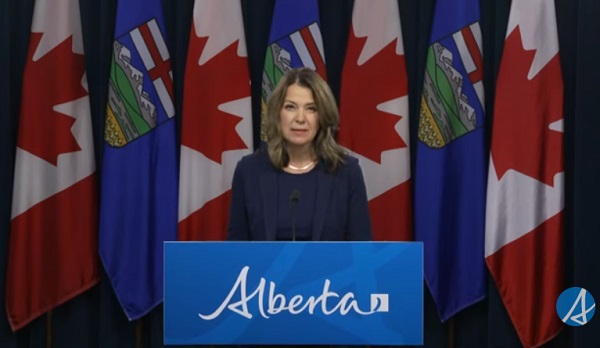Uncategorized
Few signs of breakthrough as May set to unveil Brexit Plan B

LONDON — Prime Minister Theresa May was set to unveil her new plan to break Britain’s Brexit deadlock on Monday — one expected to look a lot like the old plan that was decisively rejected by Parliament last week.
May was scheduled to brief the House of Commons on how she intends to proceed. There were few signs she planned to make radical changes to her deal, though she may seek alterations to its most contentious section, an insurance policy known as the “backstop” that is intended to guarantee there are no customs checks along the border between EU member Ireland and the U.K.’s Northern Ireland after Brexit.
The EU insists it will not renegotiate the withdrawal agreement, and says the backstop is an integral part of the deal.
“This is the text we all invested ourselves in,” Austrian Foreign Minister Karin Kneissl said as she arrived for a meeting of EU ministers in Brussels.
British lawmakers are due to vote on May’s “Plan B,” and possible amendments, on Jan. 29, two months before Britain is due to leave the EU.
Britain and the EU sealed a divorce deal in November after months of tense negotiations. But the agreement has been rejected by both sides of Britain’s divide over Europe. Brexit-backing lawmakers say it will leave the U.K. tethered to the bloc’s rules and unable to forge an independent trade policy. Pro-Europeans argue it is inferior to the frictionless economic relationship Britain currently enjoys as an EU member.
After her deal was thrown out last week by a crushing 432-202 vote in Parliament, May said she would consult with lawmakers from all parties to find a new way forward.
But Labour Party leader Jeremy Corbyn called the cross-party meetings a “stunt,” and other opposition leaders said the prime minister did not heed their entreaties to rule out a “no-deal” Brexit and retain close economic ties with the EU.
Instead, May looks set to try to win over pro-Brexit Conservatives and her party’s Northern Irish ally, the Democratic Unionist Party. Both groups say they will not back the deal unless the border backstop is removed.
May’s spokesman James Slack said May’s talks with opposition lawmakers were “genuine,” and that a “significant number” had expressed concerns about the backstop.
He said it was clear “we’re going to have to come forward with something that is different” to get Parliament’s approval.
Britain’s political impasse over Brexit is fueling concerns that the country may crash out of the EU on March 29 with no agreement in place to cushion the shock. That could see tariffs imposed on goods moving between Britain and the EU, sparking logjams at ports and shortages of essential supplies.
Labour Party Brexit spokesman Keir Starmer said Sunday that a no-deal Brexit would be “catastrophic,” and it was “inevitable” Britain will have to ask the EU to extend the two-year countdown to exit.
Several groups of lawmakers are trying to use parliamentary rules and amendments to May’s plan to block the possibility of Britain leaving the EU without a deal.
One of those legislators, Labour’s Yvette Cooper, said May was shirking her responsibility to the country by refusing to take “no deal” off the table.
“I think she knows that she should rule out ‘no deal’ in the national interest because it would be so damaging,” Cooper told the BBC. “She’s refusing to do so, and I think she’s hoping that Parliament will do this for her. That is not leadership.”
EU leaders, meanwhile, expressed frustration with British indecision.
“We now know what they don’t want in London,” German Foreign Minister Heiko Maas said. “Now we must at last find out what they want.”
Chief EU Brexit negotiator Michel Barnier said that while the EU would not amend the legally binding withdrawal agreement, it was ready to adjust the political declaration — a non-binding statement on future relations that forms the second part of the divorce deal.
Spanish Foreign Affairs Minister Josep Borrell said it was crucial to find out what type of deal Britain’s Parliament would support.
“We cannot keep negotiating something this way and when everything is negotiated, the U.K. Parliament refuses,” he said in Brussels. “We have to have the guarantee that the proposal has the parliamentary support not to be refused again.”
___
Casert reported from Brussels.
___
Follow AP’s full coverage of Brexit at: https://www.apnews.com/Brexit
Jill Lawless And Raf Casert, The Associated Press
Uncategorized
Trump Admin Establishing Council To Make Buildings Beautiful Again


From the Daily Caller News Foundation
By Jason Hopkins
The Trump administration is creating a first-of-its-kind task force aimed at ushering in a new “Golden Age” of beautiful infrastructure across the U.S.
The Department of Transportation (DOT) will announce the establishment of the Beautifying Transportation Infrastructure Council (BTIC) on Thursday, the Daily Caller News Foundation exclusively learned. The BTIC seeks to advise Transportation Secretary Sean Duffy on design and policy ideas for key infrastructure projects, including highways, bridges and transit hubs.
“What happened to our country’s proud tradition of building great, big, beautiful things?” Duffy said in a statement shared with the DCNF. “It’s time the design for America’s latest infrastructure projects reflects our nation’s strength, pride, and promise.”
“We’re engaging the best and brightest minds in architectural design and engineering to make beautiful structures that move you and bring about a new Golden Age of Transportation,” Duffy continued.
Mini scoop – here is the DOT’s rollout of its Beautifying Transportation Infrastructure Council, which will be tasked with making our buildings beautiful again. pic.twitter.com/
9iV2xSxdJM — Jason Hopkins (@jasonhopkinsdc) October 23, 2025
The DOT is encouraging nominations of the country’s best architects, urban planners, artists and others to serve on the council, according to the department. While ensuring that efficiency and safety remain a top priority, the BTIC will provide guidance on projects that “enhance” public areas and develop aesthetic performance metrics.
The new council aligns with an executive order signed by President Donald Trump in August 2025 regarding infrastructure. The “Making Federal Architecture Beautiful Again” order calls for federal public buildings in the country to “respect regional architectural heritage” and aims to prevent federal construction projects from using modernist and brutalist architecture styles, instead returning to a classical style.
“The Founders, in line with great societies before them, attached great importance to Federal civic architecture,” Trump’s order stated. “They wanted America’s public buildings to inspire the American people and encourage civic virtue.”
“President George Washington and Secretary of State Thomas Jefferson consciously modeled the most important buildings in Washington, D.C., on the classical architecture of ancient Athens and Rome,” the order continued. “Because of their proven ability to meet these requirements, classical and traditional architecture are preferred modes of architectural design.”
The DOT invested millions in major infrastructure projects since Trump’s return to the White House. Duffy announced in August a $43 million transformation initiative of the New York Penn Station in New York City and in September unveiledmajor progress in the rehabilitation and modernization of Washington Union Station in Washington, D.C.
The BTIC will comprise up to 11 members who will serve two-year terms, with the chance to be reappointed, according to the DOT. The task force will meet biannually. The deadline for nominations will end Nov. 21.
Uncategorized
New report warns WHO health rules erode Canada’s democracy and Charter rights

The Justice Centre for Constitutional Freedoms has released a new report titled Canada’s Surrender of Sovereignty: New WHO health regulations undermine Canadian democracy and Charter freedoms. Authored by Nigel Hannaford, a veteran journalist and researcher, the report warns that Canada’s acceptance of the World Health Organization’s (WHO) revised International Health Regulations (IHR) represents a serious erosion of national independence and democratic accountability.
The IHR amendments, which took effect on September 19, 2025, authorize the WHO Director-General to declare global “health emergencies” that could require Canada to follow directives from bureaucrats in Geneva, bypassing the House of Commons and the will of Canadian voters.
The WHO regards these regulations as “binding,” despite having no ability or legal authority to impose such regulations. Even so, Canada is opting to accept the regulations as binding.
By accepting the WHO’s revised IHR, the report explains, Canada has relinquished its own control over future health crises and instead has agreed to let the WHO determine when a “pandemic emergency” exists and what Canada must do to respond to it, after which Canada must report back to the WHO.
In fact, under these International Health Regulations, the WHO could demand countries like Canada impose stringent freedom-violating health policies, such as lockdowns, vaccine mandates, or travel restrictions without debate, evidence review, or public accountability, the report explains.
Once the WHO declares a “Pandemic Emergency,” member states are obligated to implement such emergency measures “without delay” for a minimum of three months.
Importantly, following these WHO directives would undermine government accountability as politicians may hide behind international “commitments” to justify their actions as “simply following international rules,” the report warns.
Canada should instead withdraw from the revised IHR, following the example of countries like Germany, Austria, Italy, Czech Republic, and the United States. The report recommends continued international cooperation without surrendering control over domestic health policies.
Constitutional lawyer Allison Pejovic said, “[b]y treating WHO edicts as binding, the federal government has effectively placed Canadian sovereignty on loan to an unelected international body.”
“Such directives, if enforced, would likely violate Canadians’ Charter rights and freedoms,” she added.
Mr. Hannaford agreed, saying, “Canada’s health policies must be made in Canada. No free and democratic nation should outsource its emergency powers to unelected bureaucrats in Geneva.”
The Justice Centre urges Canadians to contact their Members of Parliament and demand they support withdrawing from the revised IHR to restore Canadian sovereignty and reject blind compliance with WHO directives.
-

 Business2 days ago
Business2 days agoTrans Mountain executive says it’s time to fix the system, expand access, and think like a nation builder
-

 Business2 days ago
Business2 days agoClean energy transition price tag over $150 billion and climbing, with very little to show for it
-

 International1 day ago
International1 day agoStrongest hurricane in 174 years makes landfall in Jamaica
-

 Business2 days ago
Business2 days agoFlying saucers, crystal paperweights and branded apples: inside the feds’ promotional merch splurge
-

 MAiD1 day ago
MAiD1 day agoStudy promotes liver transplants from Canadian euthanasia victims
-

 Business1 day ago
Business1 day agoCanada has given $109 million to Communist China for ‘sustainable development’ since 2015
-

 Internet1 day ago
Internet1 day agoMusk launches Grokipedia to break Wikipedia’s information monopoly
-

 Business2 days ago
Business2 days agoCanada’s combative trade tactics are backfiring








